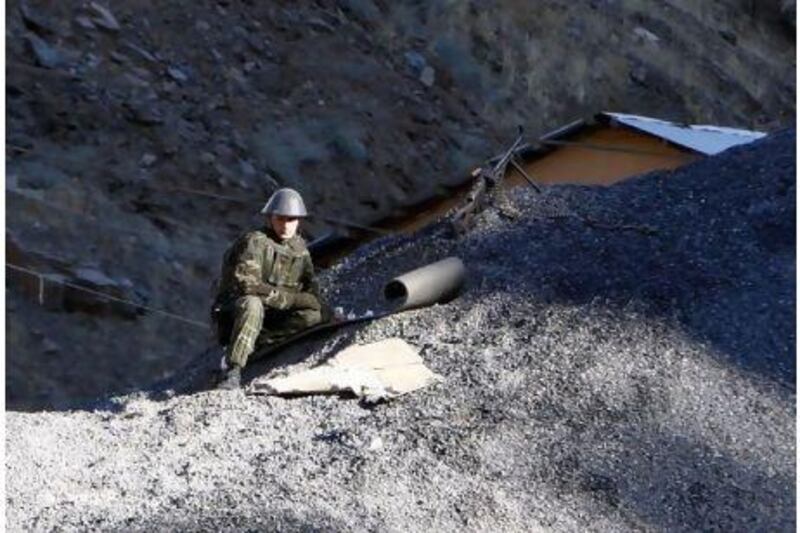ISTANBUL // Turkey's Kurds tried to remain hopeful for a peaceful ending as the Turkish military pushed ahead with its large operation yesterday against Kurdish rebels inside the country and in Iraq, activists said.
"People are not losing hope. After all, they have been going through this kind of thing for 30 years," said Sait Caglayan, a human-rights activist in Hakkari province. He was referring to the military confrontation between the Turkish army and the Kurdistan Workers' Party (PKK), a Kurdish rebel group, which started in 1984 and has cost tens of thousands of lives.
Following a PKK attack in Hakkari that killed 24 Turkish soldiers on Wednesday, the Turkish military launched a broad offensive against the rebels. Several thousand soldiers, mostly members of special forces units, as well as helicopter gunships and fighter jets, have been involved in the operation.
Much of the action was taking place inside Turkey, but some units had been sent into Iraq, the general staff said yesterday. The PKK has been using northern Iraq to launch attacks.
The statement did not say how long the operation would last. Turkey's last major cross-border operation against PKK fighters and installations in Iraq, in February 2008, lasted a week and killed 250 rebels, according to the military.
Turkey's south-east, home of the country's estimated 12 million Kurds, has seen clashes between soldiers and the PKK for much of the past 27 years. Many local people have come to accept military conflict as a fact of life.
The situation in Hakkari was calm yesterday, said Mr Caglayan, who runs the Hakkari chapter of the Human Rights Association (IHD), a non-governmental group.
"Life goes on. People go to Friday prayers like always," he said, adding that fighter jets and helicopter gunships could sometimes be seen in the sky.
"Of course, people do not want other people to die. They want peace," Mr Caglayan said. Many Kurds were putting their hopes into all-party talks about a new constitution that started in Ankara this week, he said. Deputies of the Party for Peace and Democracy (BDP), Turkey's main Kurdish party, were taking part in the negotiations. "The people's representatives are there, in parliament."
Emin Ermin of the IHD in Diyarbakir, the biggest city of Turkey's Kurdish region, also said people were still hoping for a peaceful solution.
"They are concerned because of the latest escalation," he said. "We have seen so much of that in the last 30 years. There must be a democratic solution."
The current constitution was drawn up under military rule in 1982. Observers say the new constitution could contribute to a peaceful solution of the Kurdish conflict if it produced a text that was acceptable for Kurds. Many Kurds feel that the current constitution, which stressed national unity above all else, has denied them cultural rights as an ethnic minority.
Timur Demir, a lawyer in Agri province, said many people in eastern Anatolia had been happy with the relative calm in recent years, which even had brought some investment into the impoverished region. Now that calm was over and people did not expect many good things in the short run, he said. Mr Demir said he was concerned that an even bigger military operation was in the offing. Government officials "are talking to the Iraqi Kurds and the Iranians", he said. "Maybe they are planning a big intervention."
Representatives of the Kurdish region in northern Iraq have promised to step up their support in the fight against the PKK. Yesterday, Turkey and Iran also vowed to collaborate in their fight against the PKK and its Iranian wing, the Party of Free Life of Kurdistan (PJAK).
"Our joint determination to struggle against the PKK and the PJAK will continue in the strongest way," Ahmet Davutoglu, the Turkish foreign minister, said after talks with his Iranian counterpart Ali Akbar Salehi in Ankara. "From now on, we will work together in a joint action plan until this terrorist threat is totally eliminated."






